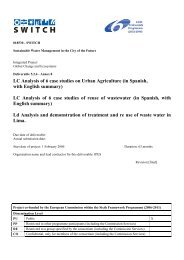Good practices for Social inclusion - Case studies and summary
Good practices for Social inclusion - Case studies and summary
Good practices for Social inclusion - Case studies and summary
Create successful ePaper yourself
Turn your PDF publications into a flip-book with our unique Google optimized e-Paper software.
limited to deliberating on grant funding – funding which often flows from short-lived<br />
government initiatives with pre-determined objectives. NRF targets focus the funding solely<br />
on deprived areas <strong>and</strong> success is judged according to this – thus participation in decisionmaking<br />
is not specifically prioritized as an end in <strong>and</strong> of itself.<br />
<br />
<br />
<br />
<br />
National level dem<strong>and</strong>s thus vie with <strong>and</strong> often supercede local priorities: The ‘delivery culture’ of<br />
New Labour focuses on targets which sets out what should happen <strong>and</strong> when, emphasizing<br />
bureaucracy over leadership, <strong>and</strong> organisational accountability <strong>and</strong> control rather than<br />
communities taking responsibility. Residents may be involved in existing processes, but it is<br />
thus difficult <strong>for</strong> real power to be ceded to local residents over decisions which might lead in<br />
very different directions.<br />
PB in the UK is being implemented more as a ‘technical fix’ than as a ‘radical political innovation’:<br />
PB is seen as a means to achieving improvements, distinct from a political vision in itself.<br />
Even where this political vision exists, the powerful delivery culture means it is often<br />
presented as a technology to deliver better outputs (e.g. the national reference group is<br />
seeking to obtain evidence of the cohesion benefits of PB to sell it within government<br />
departments<br />
PB leaders in the UK avoid espousing an overtly political agenda: This de-politicisation occurs<br />
partly because the officials leading such pilots tend to be officials working in local statutory<br />
organisations, rather than being promoted by specific political parties, as is the case in Brazil.<br />
A more overt promotion of the political nature of the process in terms of achieving a real redistribution<br />
of power is important.<br />
Key success factors: the size of the LSP - large enough as a statutory organisation to have some<br />
resources to invest, but small enough to avoid excessive bureaucracy; senior managers being<br />
allowed to experiment; on-going relationships with other key actors; ownership by the<br />
voluntary <strong>and</strong> community sector<br />
Source: Blakey, 2007<br />
Box 8 : Challenges <strong>and</strong> lessons from the north of Engl<strong>and</strong> city case study of PB<br />
In the UK the prevailing delivery <strong>and</strong> targets-oriented culture promoted by central<br />
government, leads to a technical fix approach to participatory budgeting involving toolkits,<br />
consultants <strong>and</strong> sellable technologies, rather than a focus on participation as a set of ideals<br />
<strong>and</strong> principles. Political voices that might promote deeper kinds of engagement are often<br />
restricted by such technical interpretations <strong>and</strong> this can affect the outcomes. According to<br />
Blakey, (2007, op cit), there is an example of a local mayor in Medellin, Colombia, who did<br />
support the local participatory budget priorities above national rules, because of his support<br />
<strong>for</strong> the nature of the process in its broadest political sense. In the UK, proponents of PB find<br />
they often have to persuade central government officials to support the process by<br />
downplaying the more trans<strong>for</strong>mational aspects of such a process, <strong>and</strong> focus on a more<br />
contingent approach in order to get off the ground.<br />
96

















